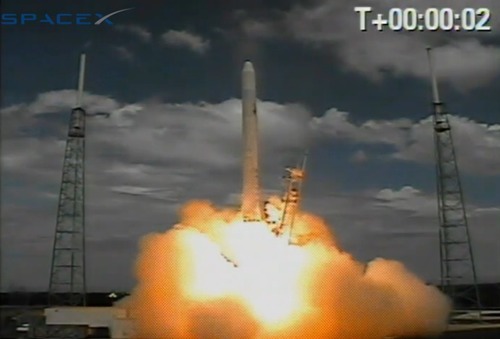
The Falcon 9 lifts off at 2:45 pm EDT Friday from Cape Canaveral, as seen in this screen capture from the SpaceX webcast.
If you had polled the attitudes of the people watching the launch of the first Falcon 9 on Friday, the most common feeling leading up to liftoff might be something like “hoping for the best but expecting the worst”. People wanted SpaceX to succeed with the Falcon 9 on Friday, but know that first launches of new rockets had no guarantee of success—something that Elon Musk and SpaceX impressed upon the community leading up to the launch.
So when the Falcon 9 lifted off at 2:45 pm EDT today and soared into the skies, eventually placing a demonstration Dragon capsule into nearly the planned orbit, the reaction was something approaching euphoria, even by Musk himself. “It’s been one of the best days of my life,” he said in a teleconference with reporters a couple of hours after the launch. “It’s certainly been one of the greatest days for the people of SpaceX.”
The launch had some drama, as well. The launch window opened at 11 am, but because of problems with an antenna for the rocket’s newly-approved flight termination system, they weren’t ready to launch until 1:30 pm. In the final seconds of the countdown, though, just as the nine rocket engines were about to ignite, the launch was aborted.
Musk said the abort was caused by a reading from an igniter on engine number three on the first stage. “The pressure rise on engine three was higher than expected,” he said, triggering the abort. “We looked at the data and concluded that… we were being a little too conservative” in the allowable values for the pressure in the engine. “So we widened that band [of allowable values], reconfigured the engine three computer, and it lifted off without a problem.”
About the only discernable problem during the launch was a roll in the second stage that appeared to speed up as the burn continued. “There was a little more roll than expected. It didn’t affect the mission,” Musk said. “That is definitely something that we want to refine,” he said, adding they didn’t immediately know the reasons for the roll.
So how did the launch feel, Elon? “When the rocket achieved orbit, there was tremendous relief and elation at SpaceX,” he said. “Upon liftoff there was sort of relief that it cleared the pad; things were obviously extremely tense here.” And his plans to celebrate? “I think with a lot of margaritas.”
After consuming those drinks, Musk and his team plans to spend about a month reviewing the data from the launch to fully characterize it and look for any issues (in addition to the second stage roll) that need to be corrected. Musk said he still planned to launch the next Falcon 9 mission, the first of three planned NASA COTS missions, later this summer. The Falcon 9 for that mission has already been built and is sitting in Texas ready to ship to the Cape; the Dragon spacecraft that it will launch is undergoing final reviews.

Leave a Reply